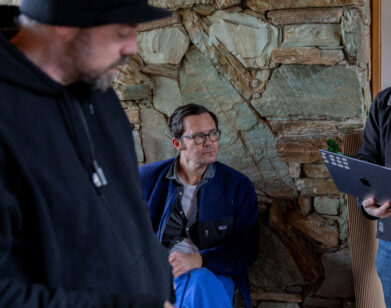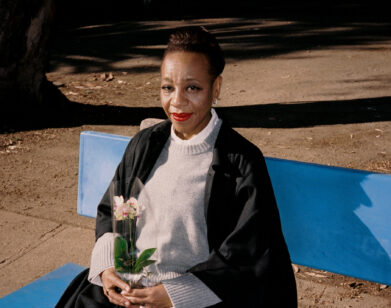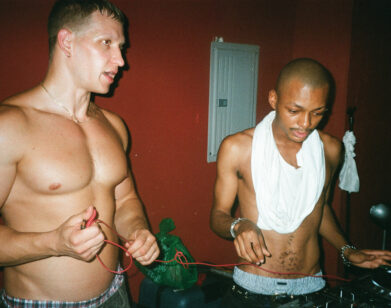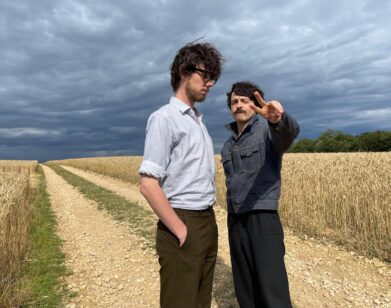Director
The Nest Director Sean Durkin Tells Jude Law Why Making Movies Can Be So Damn Hard
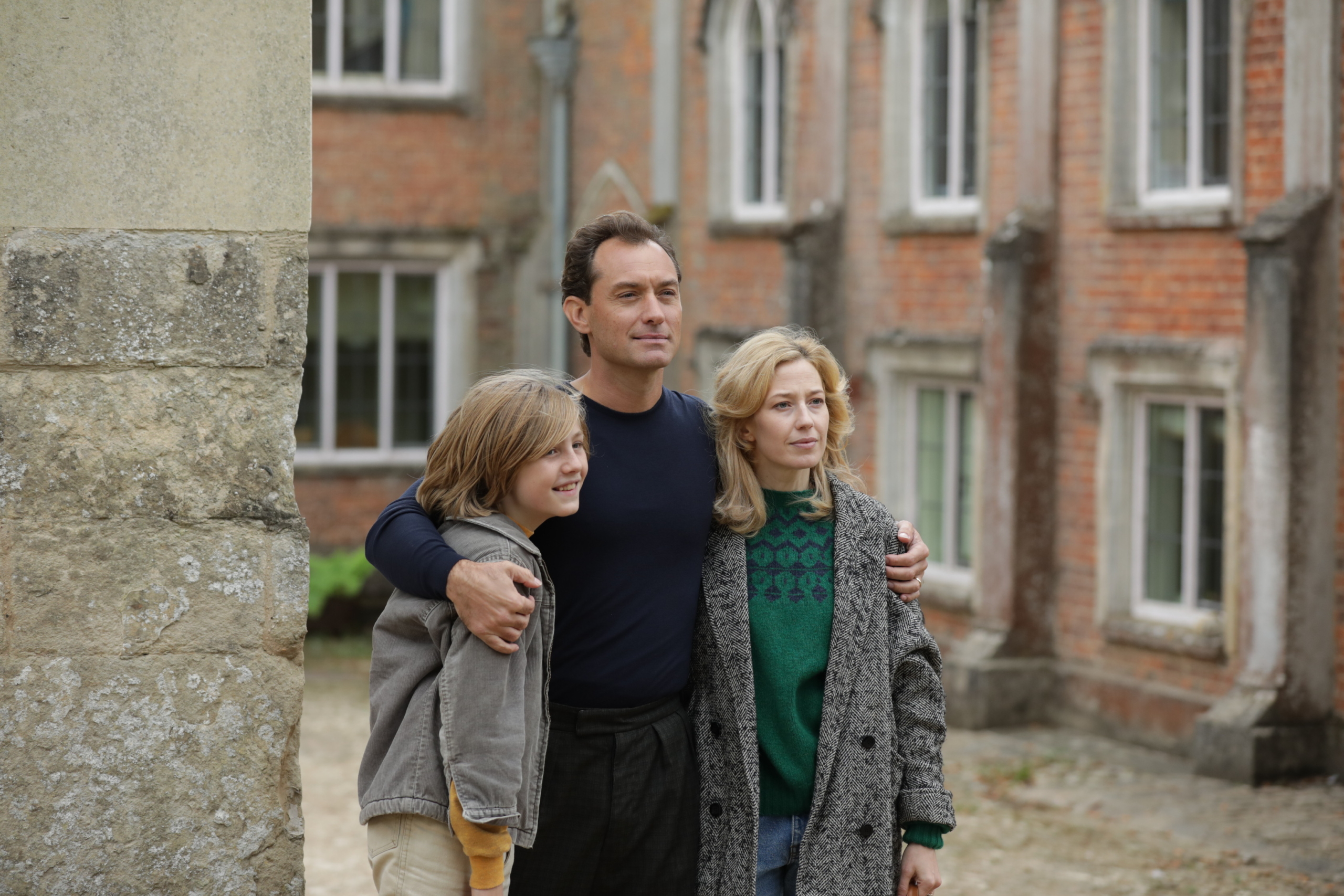
It’s hard to believe that Sean Durkin’s last film came out in 2011. Martha Marcy May Marlene was the type of buzzy debut that typically launches a filmmaker’s career into the stratosphere, and while Durkin returned to the director’s chair in 2013 with the British miniseries Southcliffe, it’s taken him nearly a decade to release his follow-up film. The Nest, which hits VOD today, is a reminder why: the deliberately-paced and meticulously-crafted story of a fractured family is the product of an uncompromising filmmaker unafraid to bypass showy, trailer-ready moments for a creeping sense of dread that must be experienced in its totality for its impact to fully land. Jude Law plays Rory O’Hara, a British expat living in the United States with his wife (Carrie Coon) and their two young children. The year is 1986, and economic realities are shifting, particularly in the U.S. and the U.K. Seeking new financial opportunity, Rory moves his family to a stately, albeit crumbling manse outside of London so that he can pursue dreams that are lofty at best, delusional at worst. As the family self-destructs under the strain of its patriarch’s ambition, the movie simmers with suspense. But Durkin never steers his story into full-blown thriller territory. Instead, he relies on his collaborators—the ominous compositions of his director of photography Mátyás Erdély and the seething performances of his two leads—to tell this frightening tale of family dysfunction and capitalism gone awry. Last month, Durkin reunited with Law to talk about why his approach to directing has made it hard for him to get movies made, and why The Nest has made that wait worthwhile.
———
JUDE LAW: Where are you?
SEAN DURKIN: I’m out in the desert.
LAW: Whereabouts in the desert are you?
DURKIN: We’re close to Joshua Tree. We got an Airbnb for a couple of days, so the kids can be in the pool. How about you?
LAW: Everyone’s good. All well and healthy. I went back to work last week on Fantastic Beasts, and that was really interesting. As you know, film crews are incredibly adaptable and were built to take on new challenges. A lot of effort has gone into getting it up and running again, but it felt pretty efficient and safe, and they have all sorts of things in place to keep testing and keep people clear on how we’re all doing.
DURKIN: That’s encouraging. In my mind, being able to shoot again feels so far away, although it’s obviously starting to happen.
LAW: Yeah, it is. And, actually, another film that I’m producing, which has a much smaller budget compared to Beasts, is also filming. As long as we don’t get hit with any more curve balls from the government, we should be alright to keep going.
DURKIN: That’s great.
LAW: Maybe before we start talking about The Nest, talk a little bit about what you’ve been doing since Southcliffe and Martha Marcy May Marlene, because quite a long time has passed. Was it on purpose?
DURKIN: Martha Marcy May Marlene came out in 2011, and then in 2012, I went back to England to make Southcliffe, which came out in 2013. And then after that, I produced James White, and once that was done, in 2013, I started writing The Nest. The Nest was my main focus, but I’d also been developing a film about Janis Joplin for a couple of years at that point. And then I was working on a TV show that was set up with AMC, and then I was attached to a couple of other projects. Each one fell through for reasons that were beyond my control. I was just working so hard to get a bunch of stuff made, and had a run of bad luck, I guess. They all kind of fell apart, one by one. But it’s an interesting thing, because The Nest was the closest and most personal to me, and rode alongside me through all of that.
LAW: Were you evolving it, or was it pretty clear from the outset what it would be?
DURKIN: I would write for anywhere from three to six months and then put it down for a year and fully be into something else, and then come back to it with fresh eyes and change something major. I can’t even remember what it was or how it started, really. But it’s always been the same core idea. It’s one of the first conversations you and I had, of finding that emotional truth of the characters. And that, for me, takes years to do. And then there’s the handoff. The moment when I start talking to you and Carrie [Coon] is a handover. I’ve put it on a page, but it comes to life in your interpretation.
LAW: I think I’ve become more and more aware that filmmaking is a process of reduction. It takes on air, it loses air, but ultimately, the goal is to get it to its essence. What’s interesting is how, unless you’re directing it, you have to step back and let it continue on a path of definition. As an actor, you have to have a generous spirit, because you have to be aware that some of it might not make it.
DURKIN: Reduction is such a great word for it. Until it’s out, the film is alive and shifting, and I feel like I’m following it. There are times in an edit where an actor’s work might be incredible, or a shot is incredible, and you want it in, but in your heart you know it’s going to go. There’s a mourning process.
LAW: When you finally realize it’s gone.
DURKIN: Editing is like spending three months wrapping your head around what has to go, and coming to accept it.
LAW: In a way, you’re describing the film’s voice coming out. It comes at you, even when you’re the writer and director.
DURKIN: I think so. There’s a subconscious truth that I want to get at when I start a project. The best way for me to work is to surround myself with the right collaborators and have them trust that I’m going to work on it incrementally, on the minor details, because that’s what makes it up. I have the subconscious idea of what is the truth that I want to capture. And in the end, I get there. I’m not cut out to be pitching stuff in competitive situations. That’s not me, and it’s not what I want from someone who works with me.
LAW: It strikes me that since we made it, it’s become more and more relevant, because it captures a very particular time when so much of what’s happening now, in a way, started. Do you feel the same, having now lived with it as a finished piece, and obviously seen the world around us shift the way it has?
DURKIN: I think the choice of setting it in 1986 around the promise of the Big Bang, you can follow that throughline into what’s going on today. And also wanting it to be about a family going through something complicated that’s not good or bad. Everyone is more than one thing.
LAW: That was an element I loved, because I absolutely got what you meant, when we first met, about capturing that truth of family. I also love that there’s optimism to it. It’s about working it out. It’s about rolling up your sleeves and getting into it all. That’s what families have got to do, right? You don’t run away, you deal with it.
DURKIN: Especially now when everyone’s stuck in the house together.
LAW: I was going to ask about other filmmakers who are having successful careers in indie films, and then are given big budgets from studios. Is that something that you’ve encountered, or is it something that you’re curious to do?
DURKIN: I think if you look at my work, there’s consistency but there’s also some variation. One of the films I was talking about before that didn’t work out was Little House on the Prairie. We worked on a great adaptation of that with a studio. When something comes to me like that did, I instinctively know if I can do it or not. I think, “Am I the best person for this? Does it speak to me?” It doesn’t matter what the size is, who it’s with, or what the scale is. It’s just about the right thing, and then making sure the people I’m working with are on the same page.
LAW: That makes sense.
DURKIN: I’ve had projects where I’ve gotten into business with the wrong people. That doesn’t work because you’re never going to be on the same page, because you have different ideas of what it can be.
LAW: That can be an indie project or a studio project.
DURKIN: Exactly. It could be anything, whether it’s for television or for film.
LAW: Speaking of television, tell me a bit about that. It’s probably the subject of the moment, with this shift in the industry to streamers. What are your feelings about being released directly on streamers, specifically with The Nest?
DURKIN: It’s all about the right platform for the right piece. When I did Southcliffe, it was close to four hours long, and it was a contained miniseries, and I didn’t see it any differently than a film. Sometimes a film’s in development, and it’s like, “Actually, is this better for TV?” For me, it’s just about the best form of storytelling, so I’m really positive about it. I think if people get to make good work and get supported to make that work, then it’s good for us as filmmakers to have those outlets. Things change so quickly that it’s just about riding the wave of the moment and trying to get something that you care about made on the best platform.
LAW: I couldn’t agree more. And I think it’s exciting that we’re at a time where we’re able to, without the snobbery of the past, go from medium to medium. I’m also aware that given what happened with the pandemic, we have to seize an opportunity. Is this a time when we try to claim back the cinema a bit? What I mean by that is that obviously no one wants the lack of opportunity to go to the cinema to kill off the smaller films or the mid-budget movies. And I keep thinking about what we want the future of cinema-going to look like. Perhaps it’s supported by streamers, this idea of having two releases. I feel like we’re at a time where you can almost reinvent it.
DURKIN: You see it happening right now. Especially with independent films, something wasn’t working. The exciting thing about this year is that there has been a shakeup, and there has been a rethink, and now it’ll be really interesting to see how that plays out long-term. Like I said, I’m an optimist.
LAW: It’s been a little while since we finished The Nest. How do you look back on that period of us making it?
DURKIN: Shooting The Nest was three of the best months of my life. Directing is probably when I’m at my best, and I love the family we created making it.
LAW: It had a very special spell, didn’t it?
DURKIN: Yeah. And finding that house, and spending time in that house was very special. It was also the team. My crew collaborated in the most fluid way I’ve seen. There was just no conflict there.
LAW: But you do know that’s because it comes from the top, right? That all trickles down from you. It goes back to the way you just described how you work, and it’s what I loved so much about the experience myself. You absolutely give your all and you come at it with your heart open. Crews and certainly actors can’t resist that. As soon as you have a director who’s doing that, you want to do your best. And you believe, too, in what you’re making. There was a strong sense of that from the beginning.
DURKIN: Thanks. [Laughs]
LAW: Awkward! [Laughs]
DURKIN: Yeah, you know, compliments, I don’t know if I can take them.
LAW: We should definitely talk about the truly magnificent Carrie Coon, who brought so much to this piece. Fearlessness and warmth and devotion. What a player, right?
DURKIN: Yeah.
LAW: For me, it was like stepping onto the court with Roger Federer. It was just incredible to see every day what she was going to bring.
DURKIN: I have to say that the day that we did in the bedroom, with you and Carrie at the house, where we did every bedroom scene in one day, it was going through an entire relationship. It felt like you were going through every single beat of a marriage, in one day. It was one of the most memorable, special days of my life. And then the day that we did the big fight was maybe the most pleasurable I’ve ever had shooting a scene, because it felt like watching a heavyweight fight. It was just letting you two go at it, and it was incredible.
LAW: You made a decision early on with the brilliant DP Mátyás Erdély to shoot almost every scene in a single shot, is that right?
DURKIN: Close to it.
LAW: Talk a little bit about that decision, because I loved it. It gave such an inescapable honesty to everything we shot, and it also suited me very much as a theater actor.
DURKIN: I believe in setting up an environment where everyone can do their best work. So that is the core of the approach. Where the camera is very specific and very controlled, it is also my intention to not get in the way. I feel like sometimes the obsession of coverage and shots really takes away from acting. It’s all about simplicity. There’s usually an option of one or two shots. It’s all about creating the right atmosphere for actors to do their best work without having to break it up.
LAW: It was a wonderful way to work. And I think it really added to the plausibility of that family life. I remember the almost synchronized dancing that we would all have to do to work out each scene, it was just fantastic. But it absolutely added to the reality.

